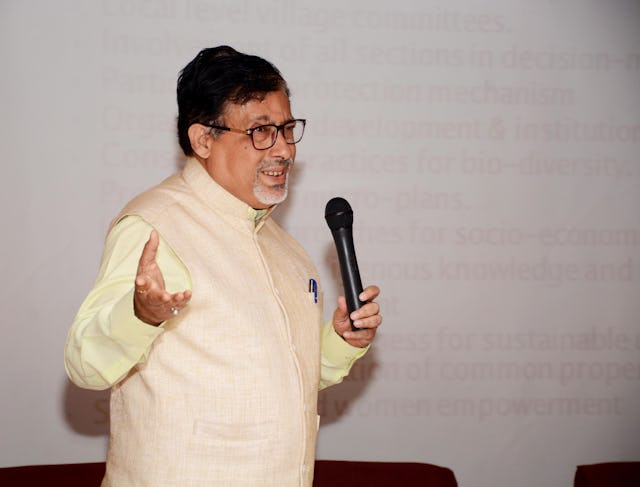Local economies point to the future
INDORE, India — How does a nation whose economy is growing by 7 percent a year allow for economic prosperity without fueling the rising inequality between rich and poor? How does it connect with the global market system without losing its spiritual and social values? These were some of the questions that were explored at a recent symposium titled "Strengthening Local Economies for a Just Global Order", held on 23 February at Devi Ahilya University in Indore.
Some 150 faculty and students participated in the event, organized by the Baha'i Chair for Studies in Development and the University's School of Economics.
This dialogue on strengthening local economies was initiated seven years ago when the Institute for Studies in Global Prosperity organized a series of seminars on the discourse on science, religion, and development in India. The Baha'i Chair in Indore is now giving greater attention to local economies in light of the growing concern in the country about the negative effects of globalization, particularly on rural populations.
In her opening remarks, Dr. Shirin Mahalati, Head of the Baha'i Chair, stressed the need to avoid dichotomies on the question of globalization, where it is either rejected wholesale or blindly embraced with no thought of its effects.
"We have to learn the balance of opening ourselves to the globe without losing all that we have that is precious," she said.
A rich dialogue about various dimensions of social and economic development in India followed, focusing primarily on the question of local economies. Speakers discussed some of the challenges and shortcomings of the current approaches to globalization and offered insights about various interventions that could assist India to navigate the path forward.
The keynote speaker, a well-known Indian economist, Amitabh Kundu, emphasized the need to strengthen local and regional economies as a response to the growing inequality and ecological degradation that India faces as its doors open to the global market.
He also proposed that thinking at the level of local economies can help India find creative solutions to dealing with the challenge of sustaining economic growth while at the same time controlling carbon emissions. "We need a paradigm shift that involves changes in lifestyles and production processes, and this will require interventions to strengthen the local economy."
Arash Fazli, a researcher with the Institute for Studies in Global Prosperity and collaborator with the Baha'i Chair, also talked about the opportunity to learn about new economic approaches at the level of villages.
"Village economies have their own logic that allows certain features of the community to be maintained—for example, the relationship to nature and social cohesion," he said. "We need to draw on both modern and traditional systems, without imitating the former or romanticizing the latter.
"When village economies develop, why must they be limited to either capitalist or socialist models?" We are seeking to forge new patterns and new models."
The Dean of Social Sciences, Dr. Kanhaiya Ahuja, emphasized the need for economic models that would reinforce the values of community life, such as compassion, contentment, cooperation, justice, and a sense of duty towards the common good.
"Unfortunately," he mentioned, "at present economic growth is being driven by consumerism and competition that are destroying these values."
Speakers also discussed the need for economic growth to be balanced and just, requiring development to be viewed within a broader vision of the spiritual and material prosperity of humanity.
"Economic models today give humanity a very limited range of options in explaining human behavior," Dr. Fazli said. "One is to explain it in terms of greed, self-interest, and profit motive. The other is to say that the only way to organize society is to have absolute equality. The path to move past these limitations is becoming clearer."
"We have to account for people's own sense of themselves as being more than material beings, more than just highly intelligent animals. We have to learn about and develop models—inspired by a more holistic sense of the human being—that can explain behavior. These models don't currently exist."
"Focusing on economic activity at the local level allows a population to learn to modernize collectively and in a consultative manner so that values the community holds dear are not sacrificed by blindly adopting external models," stated Dr. Fazli. "An active process of learning is under way at the level of villages and localities as they apply certain economic and spiritual principles with the aim of achieving prosperity in the whole sense of the word. This is a process that can gain in strength day after day."

